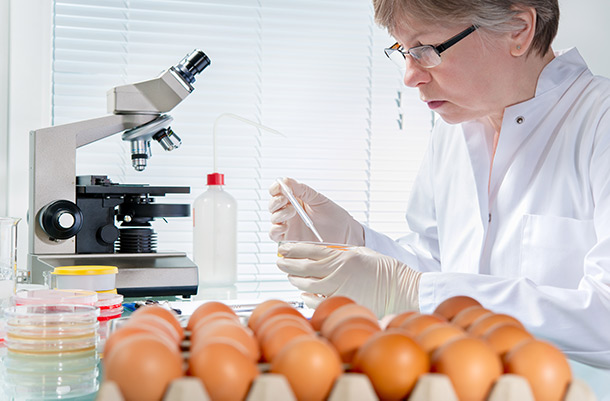Chicken immunoglobulins
Amphibians, reptiles, and birds express the immunoglobulin (Ig) heavy chain class isotype IgY as opposed to IgG found in mammals. IgY is the predominant Ig circulating in the blood and is present in egg yolk. With the exception of an additional constant domain (CH4), the structure of IgY is very similar to mammalian IgG and functionally, IgY plays a similar biological role, providing defense against infectious agents.
Chicken – an alternative host used for mammalian-derived immunogens
Chicken-derived primary antibodies retain the advantages afforded by using polyclonal antibodies, while providing researchers with a unique alternative to conventional mammalian-derived antibodies.
Chickens provide a novel host for raising primary antibodies against highly conserved mammalian proteins. Conserved proteins from one mammalian species may not be adequately divergent to elicit an immune response in another mammalian species to generate antibodies with sufficient yields and affinities for use as primary antibodies. Chickens being a different class of animal, are suitably different from mammals to enable efficient primary antibody production against mammalian proteins.
In addition, chicken IgY can be harvested from egg yolks, a process that bypasses the need for regular bleeding of the host animal and yields similar antibody quantities as conventional production methods.
Anti-Chicken Antibodies for Immunoassays
Given the rising popularity of chicken primary antibodies in research and commercial applications such in vitro diagnostic assays, anti-chicken secondary antibody detection reagents become essential. While structurally and functionally similar to their mammalian counterparts, avian immunoglobulins have marked differences in amino acid sequence and epitope landscape. As a consequence, secondary antibodies generated against IgG from mammalian species show little or no immunological cross-reactivity to immunoglobulins from avian species, like chicken, and vice versa.
Capture antibodies directed against target molecules and the conjugated secondary antibodies used to detect them are typically raised in mammalian hosts. Control reagents run alongside these immunoglobulins in an assay must not interfere with any reagents that contribute to the test result and the inherently low reactivity of anti-mammalian IgG’s to chicken immunoglobulins makes IgY a particularly useful control protein. Similarly, the reduced binding of anti-chicken (IgY) antibodies to mammalian IgG reduces the chance of interaction between reagents which may cause background.
